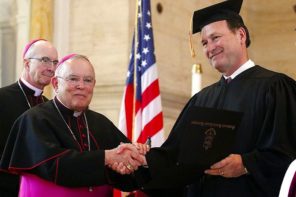The Washington Post reports on the growing realization among gay rights groups that a Supreme Court victory on the issue of same-sex marriage might not be “the end of the marriage fight,” with some advocates settling in for a protracted battle over religious freedom laws.
Conservative leaders are predicting that “a court ruling legalizing same-sex marriage will mobilize conservative activists as did Roe v. Wade,” however, according to the Post:
Gay rights groups contend that comparisons to Roe v. Wade are exaggerated, citing the enormous jump in recent years in public support for same-sex marriage as evidence that the country is ready.
 It’s an article of faith on both the left and the right that much of the backlash over Roe was engendered because the country wasn’t “ready” for the decision to legalize abortion and, by inference, the political quagmire that resulted from Roe could have been avoided had the Supreme Court not gotten too far ahead of public opinion on same-sex marriage. Even Ruth Bader Ginsberg, a liberal icon, has voiced the opinion that Roe went “too far, too fast” and that by contrast same-sex marriage won’t be a “large adjustment” because in recent years, “The change in people’s attitudes on that issue has been enormous.”
It’s an article of faith on both the left and the right that much of the backlash over Roe was engendered because the country wasn’t “ready” for the decision to legalize abortion and, by inference, the political quagmire that resulted from Roe could have been avoided had the Supreme Court not gotten too far ahead of public opinion on same-sex marriage. Even Ruth Bader Ginsberg, a liberal icon, has voiced the opinion that Roe went “too far, too fast” and that by contrast same-sex marriage won’t be a “large adjustment” because in recent years, “The change in people’s attitudes on that issue has been enormous.”
But the idea that the public didn’t support the legalization of abortion pre-Roe doesn’t square with reality. In fact, a widely circulated Gallup Poll done in June of 1972, more than six months before the Roe decision, found that 64 percent of Americans “favor a law which would permit a woman to go to a doctor to end a pregnancy at any time during the first three months.”
And the growth in support for legal abortion in the few years prior was nothing short of astounding. Only 40 percent of Americans agreed that first trimester abortion should be legal in December of 1969, but that number increased to 50 percent in May of 1971 and to 57 percent in January of 1972.
By contrast, the Post reports that the most recent Wall Street Journal/NBC Poll found that 59 percent of Americans support same sex marriage, up from 30 percent in 2004.
If a lack of popular support for abortion doesn’t explain the backlash against Roe, what does and what does this portend for same-sex marriage? Back in 2011, Linda Greenhouse and Reva Siegel argued in the Yale Law Journal that what caused the polarized conflict against Roe wasn’t the lack of popular support for abortion legalization. In fact, it was precisely the opposite. It was the growing public interest in and acceptance of abortion rights that caused the leadership of the Catholic Church to organize a top-down effort to quash the movement.
The National Conference of Catholic Bishops’ strident anti-abortion advocacy, and the robust pro-life network they created with the church’s resources, caught the attention of strategists for the Republican Party, who theorized that abortion could be used as a wedge issue to break Catholics away from the Democratic Party. In fact, during the 1972 election campaign, well before Roe, President Nixon used the abortion issue to attract Catholic voters.
Greenhouse and Siegel assert that issue of abortion exploded because it had “become entangled in party politics.” On the one hand it was fueled by the involvement of the Catholic Church, which had the clout to create “a large, well-financed, and nationally networked group that voted on a single-issue basis,” while on the other hand, the increasing identification of a pro-choice position with a progressive, feminist worldview had become associated with the Democratic Party.
If Greenhouse and Siegel are correct that it was “ordinary politics” that produced the long-running conflict over abortion, and the concomitant political polarization, there’s no reason to believe that same-sex marriage won’t become similarly entangled. That’s because even though the contours of the battle may be different, it’s the same fight over the meaning of family, the authority of traditional (usually religious) leaders, the meaning and limits of sexual expression and autonomy.
That’s why the argument over religious freedom laws got so heated so fast and why it’s disingenuous for supporters of such laws to suggest that they’re just minor, limited concessions to social conservatives who have lost the bigger war. These laws aren’t really about making a space for a baker to refuse to provide a wedding cake to a same-sex couple. They’re a beachhead in a battle that will continue to play out for years to come.




